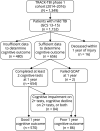Cognitive Outcome 1 Year After Mild Traumatic Brain Injury: Results From the TRACK-TBI Study
- PMID: 35173018
- PMCID: PMC8967334
- DOI: 10.1212/WNL.0000000000200041
Cognitive Outcome 1 Year After Mild Traumatic Brain Injury: Results From the TRACK-TBI Study
Abstract
Background and objectives: The objectives of this study were to develop and establish concurrent validity of a clinically relevant definition of poor cognitive outcome 1 year after mild traumatic brain injury (mTBI), to compare baseline characteristics across cognitive outcome groups, and to determine whether poor 1-year cognitive outcome can be predicted by routinely available baseline clinical variables.
Methods: Prospective cohort study included 656 participants ≥17 years of age presenting to level 1 trauma centers within 24 hours of mTBI (Glasgow Coma Scale score 13-15) and 156 demographically similar healthy controls enrolled in the Transforming Research and Clinical Knowledge in TBI (TRACK-TBI) study. Poor 1-year cognitive outcome was defined as cognitive impairment (below the ninth percentile of normative data on ≥2 cognitive tests), cognitive decline (change score [1-year score minus best 2-week or 6-month score] exceeding the 90% reliable change index on ≥2 cognitive tests), or both. Associations of poor 1-year cognitive outcome with 1-year neurobehavioral outcomes were performed to establish concurrent validity. Baseline characteristics were compared across cognitive outcome groups, and backward elimination logistic regression was used to build a prediction model.
Results: Mean age of participants with mTBI was 40.2 years; 36.6% were female; 76.6% were White. Poor 1-year cognitive outcome was associated with worse 1-year functional outcome, more neurobehavioral symptoms, greater psychological distress, and lower satisfaction with life (all p < 0.05), establishing concurrent validity. At 1 year, 13.5% of participants with mTBI had a poor cognitive outcome vs 4.5% of controls (p = 0.003). In univariable analyses, poor 1-year cognitive outcome was associated with non-White race, lower education, lower income, lack of health insurance, hyperglycemia, preinjury depression, and greater injury severity (all p < 0.05). The final multivariable prediction model included education, health insurance, preinjury depression, hyperglycemia, and Rotterdam CT score ≥3 and achieved an area under the curve of 0.69 (95% CI 0.62-0.75) for the prediction of a poor 1-year cognitive outcome, with each variable associated with >2-fold increased odds of poor 1-year cognitive outcome.
Discussion: Poor 1-year cognitive outcome is common, affecting 13.5% of patients with mTBI vs 4.5% of controls. These results highlight the need for better understanding of mechanisms underlying poor cognitive outcome after mTBI to inform interventions to optimize cognitive recovery.
© 2022 American Academy of Neurology.
Figures



 $35,000, health insurance, no depression, no developmental disability, nonassault injury, Rotterdam score <3, emergency department (ED) glucose <200 mg/dL or not done, no diabetes, Glasgow Coma Scale (GCS) score ≥14, no anxiety, and negative toxicology screen. AUC = area under the curve; mTBI = mild traumatic brain injury.
$35,000, health insurance, no depression, no developmental disability, nonassault injury, Rotterdam score <3, emergency department (ED) glucose <200 mg/dL or not done, no diabetes, Glasgow Coma Scale (GCS) score ≥14, no anxiety, and negative toxicology screen. AUC = area under the curve; mTBI = mild traumatic brain injury.Comment in
-
Author Response: Cognitive Outcome 1 Year After Mild Traumatic Brain Injury: Results From the TRACK-TBI Study.Neurology. 2022 Oct 25;99(17):774. doi: 10.1212/WNL.0000000000201416. Neurology. 2022. PMID: 36280279 No abstract available.
-
Reader Response: Cognitive Outcome 1 Year After Mild Traumatic Brain Injury: Results From the TRACK-TBI Study.Neurology. 2022 Oct 25;99(17):773. doi: 10.1212/WNL.0000000000201415. Neurology. 2022. PMID: 36280282 No abstract available.
References
-
- James SL, Theadom A, Ellenbogen RG, Bannick MS; GBD 2016 Traumatic Brain Injury and Spinal Cord Injury Collaborators. Global, regional, and national burden of traumatic brain injury and spinal cord injury, 1990-2016: a systematic analysis for the Global Burden of Disease Study 2016. Lancet Neurol. 2019;18:56-87. - PMC - PubMed
-
- Nordström P, Michaëlsson K, Gustafson Y, Nordström A. Traumatic brain injury and young onset dementia: a nationwide cohort study. Ann Neurol. 2014;75(3):374-381. - PubMed
